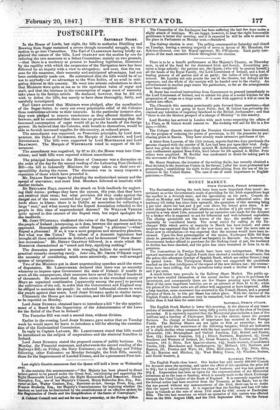POSTSCRIPT.
SATURDAY NIGHT.
Earl GREY avowed that Ministers were pledged, after the equalization of the Sugar-duties, to carry out every practicable relief of the Colonies from restrictions adverse to their interests. In the particular instance also, they were pledged to remove restrictions as they affected distillers and brewers; and he contended that there was no ground for assuming that the increased consumption of sugar would all go to the benefit of the foreign grower. He believed that the Colonies, with benefit to themselves, would be able to furnish increased supplies for this country, at reduced prices.
The amendment was supported, on Protection principles, by Lord ASH- BURTON, the Duke of RICHMOND, the Marquis of SALISBURY, and Lord REDESDALE. The bills were supported by Lord MONTEAGLE and Lord BEAUMONT. The Marquis of WESTMEATH voted in support of the Go- vernment.
The amendment was negatived, by 37 to 25; the House went into Com- mittee; and both bills were reported without amendment.
The principal business in the House of Commons was a discussion on the order of the day for the second reading of the Labouring Poor (Ireland) Bill—the bill to indemnify Ministers for steps taken on their own re- sponsibility during the recess. The discussion was in many respects a repetition of those which have preceded it.
Mr. DILLON BRowN begat, by pleading the undiminished misery and the spread of starvation; and more Irish Members followed at intervals with similar recitals.
Sir BENJAMIN HALL renewed the attack on Irish landlords for neglect- ing their duties: perhaps they have the excuse, this year, that they have not received their rents; but what provision did they make against the danger out of the rents received last year? Nor are the individual land- lords alone to blame: there is in Dublin an association for collecting a large " rent," and what money has the Repeal Association refunded to the people in this time of unprecedented distress? Sir WH...Lust VERNER quite agreed in this censure of the Repeal rent, but urged apologies for the landlords.
Mr. JoHN O'CoNNELL vindicated the value of the Repeal Association to the people of Ireland ; interposing, as it does, between the oppressor and the oppressed. Honourable gentlemen called Repeal " a phantom "—what! Repeal a phantom! If so, it was a most gorgeous and attractive phantom. But what was the Union? The refusal of a domestic legislature had brought all these misfortunes on Ireland; and he denounced " these shame- less accusations." Mr. HENRY Gaarrzie followed, in a strain which Mr. ROEBUCK characterized as "sound and fury, signifying nothing."
The discussion proceeded in this wrangling fashion for several hours; practical remarks occurring rarely. Inter alia, Mr. SMITH O'Bitiest urged the necessity of considering, much more attentively, some well-arranged system of emigration.
Two of the Ministers put in short unpretending speeches amid the storm of disputation. Mr. LABOUCHERE declared that there was no necessity whatever to impress upon Government the state of Ireland: if unable to avert all the consequences, their measures have saved the lives of hundreds -of thousands. He understood that there exists in the wretched county of Mayo an organized combination [apparently among the poor] to prevent the cultivation of the soil, in order that the Government and England may be obliged to maintain the people: he exhorted influential classes to warn the people against that snare. Lord JOHN RUSSELL spoke in similar terms. Ultimately the House got into Committee, and the bill passed that stage; to be reported on Monday.
Lord JoHN Russet'. obtained leave to introduce a bill " for the appoint- ment of a Board for the Supervision of the Administration of the Laws for the Relief of the Poor in Ireland."
The Factories Bill was read a second time, without division.
Earlier in the evening, Lord JOHN RUSSELL gave notice that on Tuesday week he would move for leave to introduce a bill for altering the constitu- tion of the Ecclesiastical Commission.
In reply to Captain LAYARD, Mr. LABOUCHERE stated that bills would be introduced on the subject of corporations and the electoral franchise in Ireland.
Lord JOHN RUSSELL stated the proposed course of public business. On Monday, the Financial statement, and afterwards the second reading of the Railways Bill; on Friday, the Navy Estimates; on the Monday and Friday following, other Estimates; on Monday fortnight, the Irish Bills, namely, those for the Improvement of Landed Estates, and for a permanent Poor-law.


























 Previous page
Previous page